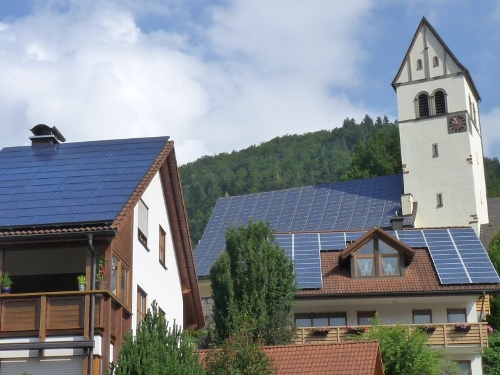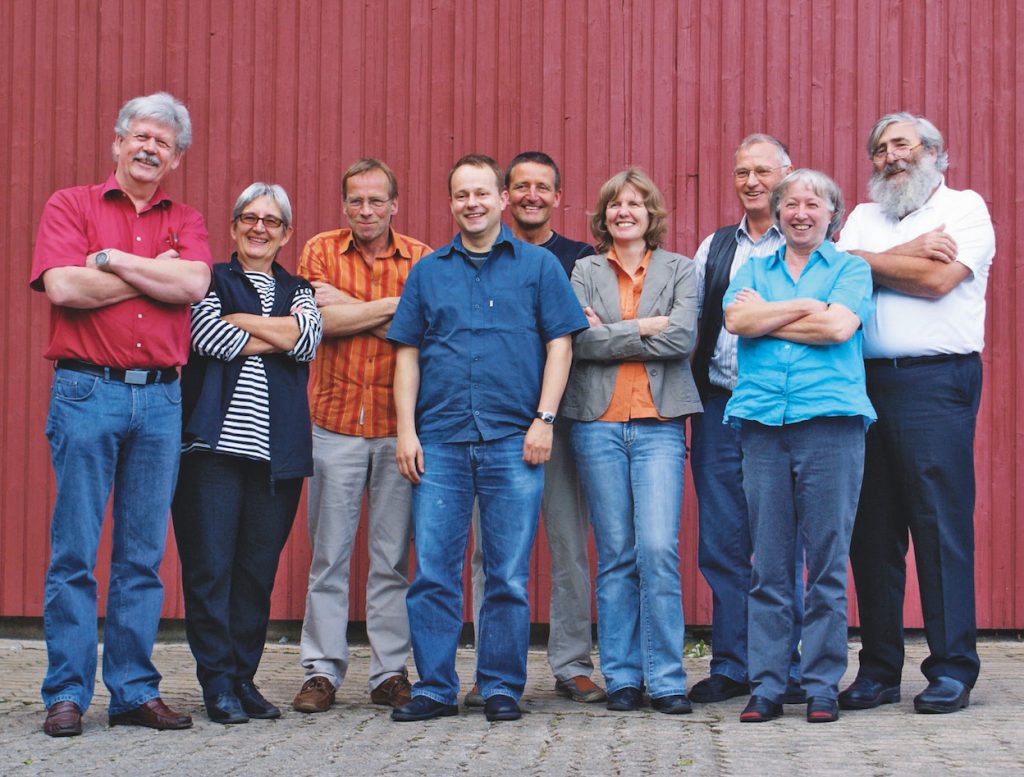A small group of concerned citizens started organizing energy conservation competitions, reactivating small water hydroelectricity power plants and installing solar power facilities. The local power grid operator, selling as much electricity as possible, including nuclear power, objected to their activities. So the public interest group attempted to obtain the concession for the local power grid themselves. Two spectacular local referendums later, this band of determined citizens was finally granted the license to take over the power supply.
The citizens founded Elektrizitätswerke Schönau (EWS), a cooperative utility company [1] providing the local community with renewable energy. Since the liberalization of the European power markets in 1998, EWS has become a Germany-wide electricity supplier. Besides producing energy from renewable sources, they are also politically active, advocating for the Energiewende (energy revolution) and helping other communities to do the same. Since 2009, EWS has been an official cooperative in which everyone can play a role and in which every member has an equal say.

Picture of the town of Schönau.
The founding of “Eltern für eine atomfreie Zukunft” or Parents for a nuclear-free future
The Ukrainian town of Chernobyl lies 2,000 kilometres from Schönau. The parents in this small conservative town were advised not to allow their children to play outside and to only eat preserved food. There were several nuclear power plants in the region, much closer than Chernobyl. Parents realized an accident with catastrophic consequences in close proximity was conceivable. They named themselves “Eltern gegen Atomkraft”, parents against nuclear power. They were disappointed and angry: governments had failed to acknowledge the issue and everything continued as before.
The parents began by getting informed about nuclear power and alternative energy sources. They interviewed the experts and collected information; but how to recruit more supporters? In order to move in a more positive direction, they changed the name of the group to “Eltern für eine atomfreie Zukunft”: parents for a nuclear-free future. They took every opportunity to draw attention, appearing at and holding local cultural events. They even formed a cabaret group. The easiest way to boycott nuclear power, however, lies in saving electricity. Therefore the group called an energy conservation competition. Then they finally managed to reach the people and support increased. This did not go down well with the local power grid operator, whose business model relied on selling as much electricity as possible, including nuclear power.
Democratic rebellion
In 1992, four years before its operating license in Schönau expired, the town’s private electricity supplier offered the town 100,000 Deutschmark for the approval of a 20-year contract extension. At the time, the power market was strictly regulated: the electricity grid operator was also the provider for all connected households. Although the citizens offered the town the same amount of money to reject the application, the license was extended. The citizens were furious; they were being ignored. They demanded a local referendum and began an information campaign, going from door-to-door, talking to everyone. The citizen group won by a narrow margin so the license was not to be extended after all.
Citizens found an alternative energy supplier
The concession was to be granted anew. The citizens had four years to establish an alternative and prove they were up for the challenge of providing the entire town with power. Mothers, teachers, policemen, doctors and other residents decided to found the “Elektrizitätswerke Schönau”(EWS). None of them were energy sector experts. With a common-sense, learning-by-doing approach and a lot of determination, they acquired the necessary knowledge.
In 1996, EWS was granted the concession. The town council had decided to put their trust in a group of persistent local citizens to do the job. Despite a heavy counter-campaign by the private local grid operator, the determined citizens were once again victorious, and took over as the new, democratically legitimate local power grid operator for Schönau. The media dubbed them “Stromrebellen”, the energy rebels.
Donation campaign raises money and attention
Anyone wanting to operate a power grid in Germany must purchase it locally. But who determines its value? Until today the answer remains unclear. The previous license holder, which was also involved in the bidding, estimated the net value of the Schönau electricity grid at 8.7 million Deutschmark. The EWS contracted an appraiser who arrived at a very different total of 4 million Deutschmark.
The people had now been fighting for 10 years for an alternative power supply in Schönau. The huge efforts of volunteers were often met with hostility. After two referendums, both having been won by only a small margin, not only was the town divided, but families were, too. EWS urgently needed concrete results, or they risked defeat. So they decided to pay the overpriced amount for the electricity grid, subject to reservation, the sum of which would be reclaimed in court (which they eventually accomplished). Of course that meant a much larger amount had to be raised, and it could not be generated by loans or shares. It seemed a mission impossible. Little did they know.
They contacted 12 large advertising agencies requesting a campaign free of charge, and were surprised by the positive response from all of them. They decided on a campaign dubbed “Ich bin ein Störfall”: in technical terms, “I am an incident”; in human terms, “I am a disturbance”. This was a slogan anti-nuclear activists could identify with. The people came out in huge support for what Schönau intended to do, not just in word, but in sums of money, big and small. They set up a fund at the newly founded GLS Gemeinschaftsbank, an ethically oriented bank, and the required amount quickly accumulated. In March, 1997, EWS took over the electricity supply in Schönau, providing the town with green power. The campaign, with all its supporters, had put Schönau on the map nationally, and soon internationally.

“Ich bin ein Störfall” campaign
The first Germany-wide green power provider with alternative methods
The European power markets were liberalised in 1998. The monopoly status of the few energy providers who shared the market was to be pried apart. Electric power generation, transmission and distribution were unbundled. Every consumer gained the freedom to choose their supplier.
EWS is the first in Germany to provide citizens nationwide with green power, and the first for which saving electricity is a priority. The rates are set so that energy conservation efforts are rewarded. Together with the anti-nuclear movement and general disapproval of monopolies, EWS is able to stand up against the big utility companies. Many promote EWS through word of mouth, so the company can increase its customer base consistently without expensive marketing campaigns. The whole situation takes on a David and Goliath appearance. The success in Schönau is also driven in part by the intellectual appeal as well as the emotional aspect.
The people support EWS because the company has strict regulations: no business with companies whose operations involve any form of nuclear, coal, oil or military industry. Only electricity generated by independent, renewable sources is bought and the expansion of renewable energy is supported. The energy revolution would be seen as a chance to recreate the system not only ecologically, but also democratically.
The success in Schönau was aided by the already widespread anti-nuclear and pro-renewable energy attitudes existing in South-West Germany even before the catastrophe at Chernobyl. In the ‘70s, a spectacular rebellion prevented the installation of a nuclear power plant in Wyhl am Kaiserstuhl. The alliance of students and farmers proved to be a force to be reckoned with.
The lights don’t go out
EWS sees itself not only as an electricity supplier, but also as part of the driving force behind the renewable energy movement. A fundamental part of EWS is “Sonnencent”, sun cent, a support fund that every customer pays into. In addition to the state feed-in remuneration [2], Sonnencent started with a feed-in-tariff for EWS customers who wished to create electricity themselves, by installing, for example, a solar unit or combined heat and power system.
In 1997, just after the takeover of the Schönau grid, a protestant minister decided to take advantage of this immediately, and planned to install a communal solar unit on the roof of his church. Despite being forbidden by officials – the church is a historic structure and thereby under protection—he had solar panels installed anyway. The decision was revised and the project received approval after all. The revenue of the unit’s production paid for a new church organ and the resonance was infectious: the neighbours installed solar panels on their homes too. In 2004, Schönau was selected as “Solarhauptstadt”, the solar city of Germany.
Sonnencent now also supports other cooperatives and initiatives who want to install wind turbines or solar panels. EWS paid to put solar panels on a school in the Philippines and on the rooftop of the Berlin university, which the students arranged.

EWS promotion sticker: “Power of the South, electricity from Schönau”
People’s participation and self-regulation as a solid foundation
Since 2009, the EWS has grown into a cooperative with approximately 5,000 members. The company has a healthy foundation because people are always willing to invest money in secure ventures. At a General Assembly a few years ago, it was decided that the payout of dividends would be limited and more money would flow into renewable energy projects. This resulted in the loss of some members, but also in an even greater number of people who decided to join the cause and become a member of EWS.
Members who want to make use of their right to vote have to come in person to the General Assembly, according to German law. Unfortunately, Schönau is rather remote and one would have to book accommodation. Most of the members who join the GA are seniors who spend their holidays in the Black Forest. EWS is still trying to involve younger people by combining the GA with cultural events such as a cabaret and concerts. At the moment roughly 250 people tend to participate in the annual GA.
EWS has been growing steadily and expanding its core. Today, EWS employs some 100 employees and supplies 170,000 customers with electricity. Employees of EWS are not obliged to be a member, but most are members because a little bonus at the end of the year is given in the form of shares. Most of the employees also participate in the GA, which strengthens their dedication and influence on decision-making.
The cooperative operates nine local electricity and gas networks because most concessions in Germany are interlinked. So one can only compete for a power grid if one also takes over the gas grid. The vision of EWS is to combine all types of grids: power, gas and district heating. Currently EWS focuses on phasing out nuclear and coal. Nevertheless, EWS is aware of the ecological costs of gas and also plans to enforce a gas phase-out. Besides, it is experimenting with using and storing superfluent wind power. Additional district heating networks, photovoltaic systems and wind turbines are being installed. In addition, 2,600 member-operated systems have been installed with the support of the EWS “Sonnencent” fund. EWS supports development and building programmes and gets involved in political debates. It also works with other communities who are fighting for the decentralisation of the energy markets. It has gone to court and fights for the right of communities to grant concessions based on their specific needs and for the right of ecology and community participation to play a role in the process.
The biggest challenge is to make people feel that society as a whole profits from an energy transition, from energy savings to limiting the consumption in all sectors. Moreover, although the energy market urges EWS to go nationwide, it does not desire to grow. The cooperative prefers to focus on its current area and increase the involvement of its members.
Website: www.ews-schoenau.de
[1] Officially a civil law company.
[2] The feed-in remuneration by the German government are payments to ordinary energy users for the renewable electricity they generate. See: http://www.fitariffs.co.uk/FITs
